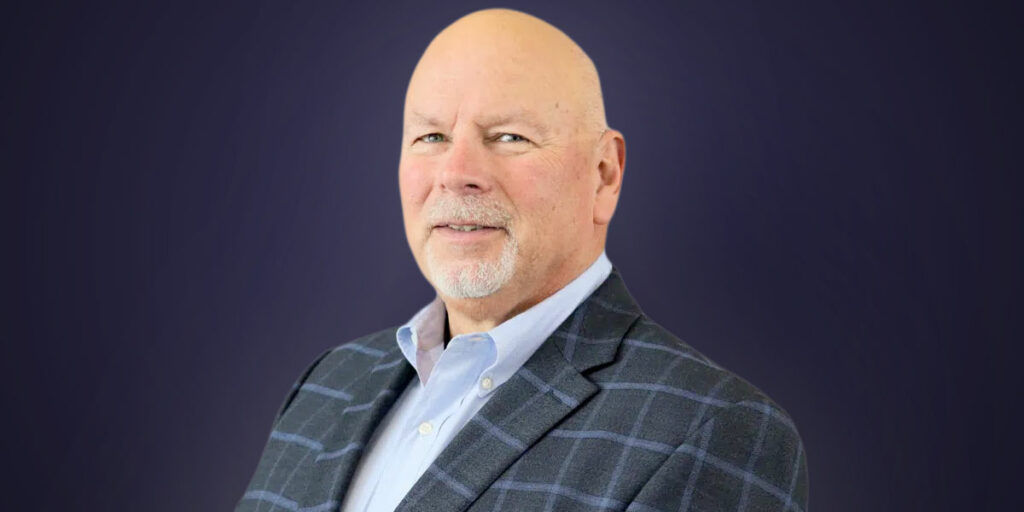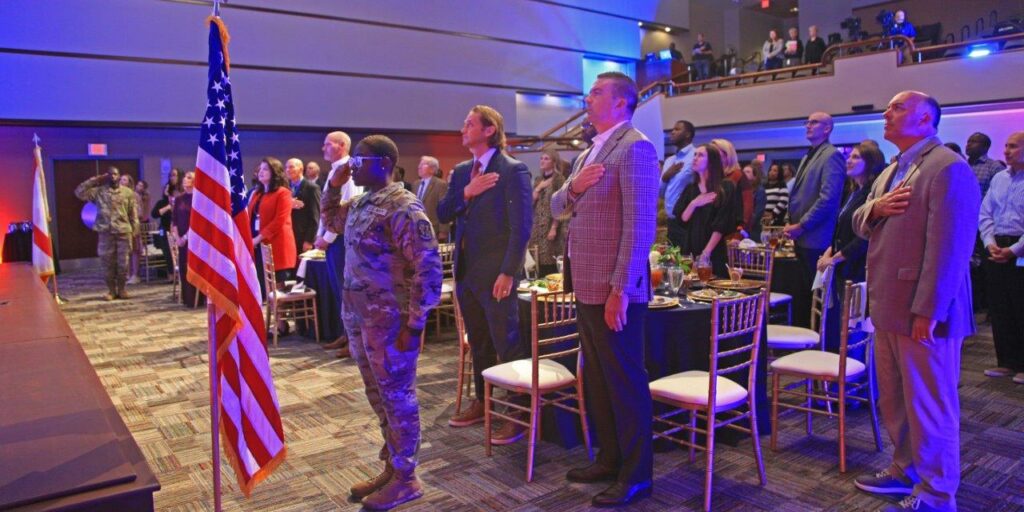Ronni and Lennox Vinson, 6-year-old twin sisters from Highland Home, were honorary coin-toss team captains for the Class 3A championship football game Thursday at 11 a.m. at Birmingham’s Protective Stadium. It’s the 25th consecutive year that kids and families from Children’s of Alabama have been honored before each of the Alabama High School Athletic Association’s state championship football games. Here is their family’s story.
When’s next season? Jessica Vinson’s 6-year-old twin daughters, budding softball players Ronni and Lennox, keep asking. Jessica smiles when they do, and not just because she’s a former high school athlete turned sports mom who, along with her husband, Lee, helped coach their little girls’ first softball team last spring.
The thought of next season unleashes a flood of emotions surrounding how the last one ended. For a few desperate hours in May, Jessica feared that little Ronni might not see the next day.
A bump on the head escalated to bleeding on the brain. A family trip from Highland Home to Montgomery turned into a hospital visit followed by a life-saving ambulance ride to Birmingham. A day that started like any other Monday slipped into the darkness of a Tuesday with her daughter in surgery at Children’s of Alabama.
The memories unleashed tears as Jessica remembered her silent prayers in those terrible moments: “God, if you need her, you can have her. But I need her.”
What brought every parent’s worst nightmare to life? What saved their precious daughter’s life? There’s no precise calculus to answer those questions, but Jessica is thankful in many directions. For her faith, her family and her friends. For Dr. Brandon Rocque, who performed the surgery, and his UAB Medicine team. For a program designed to educate youth coaches like her to keep children like Ronni active, healthy and safe.
In Jessica’s words, “CoachSafely helped save my daughter’s life.”
Not long before, Jessica and Lee had signed up Ronni and Lennox to play softball with Greenville Parks and Recreation. Youth sports are a family affair there. Matt Langford, whose dad coached there, who grew up playing ball there, whose children have played there, has worked for the department for 15 years. When he’s not managing the facilities, he fills in as a coach where needed. That’s how he came to meet Ronni and Lennox and their parents. He was the head coach of the Diamond Divas.
As is too often the case in youth sports, a shortage of coaches led Langford to ask for volunteers to help as his assistants. The Vinsons quickly stepped up. “My two are a handful,” Jessica said. “It would probably be helpful if I was out there anyway.”
They were equally as eager when Langford told them of a relatively new requirement for all coaches. They would have to complete the CoachSafely training course in injury recognition and prevention.
In 2018, Alabama became the first state to pass a law requiring the annual training for youth coaches. Several state legislators at the time echoed a powerful, prophetic sentiment in support of the groundbreaking law: If it helps to save even one life, it’ll be worth it.
Gov. Kay Ivey said she signed the Coach Safely Act (AL Code 2018-496) because youth sports injuries “have become far too common” and “trained coaches can reduce or prevent the impact of an injury.”
The Coach Safely Act is administered by the Alabama Department of Public Health, which approves the courses that meet the law’s standards. The CoachSafely Foundation’s medical advisory board – led by Dr. James Andrews – developed its online training course, which exceeds the law’s comprehensive mandate by covering a variety of subjects from concussions to overuse injuries to mental health.
In 2019, CoachSafely partnered with the Alabama Recreation and Parks Foundation to deliver the course to youth coaches through the Alabama Recreation and Parks Association, which has 92 agencies in cities and towns throughout the state.
“The ARPA/CoachSafely Initiative is providing, at no cost to the coach or community, education and training that enables our coaches to facilitate safe environments for our kids,” said Natalie Norman, ARPA’s executive director. “This is not a static endeavor but a growing service, helping our coaches to help our kids. Keeping the youths of Alabama safer and healthier through athletic activity – it’s a win-win. The ARPA is proud to be the boots on the ground in this effort.”
Greenville Parks and Rec joined in this statewide initiative, encouraged by the advocacy of Mayor Dexter McLendon, who wanted his city to be an early adopter of CoachSafely training. McLendon explained his motivation in requiring all Parks and Rec coaches and staffers to complete the course before the seasons begin in simple but powerful terms: “I want to keep the kids safe.”
The Vinsons completed the CoachSafely course before softball season and, not two weeks later, they needed the knowledge they’d gained. Ronni hit her head. Not playing softball. Swinging from a vine at home. At first, it seemed like a typical childhood mishap. She cried and she hurt, but not terribly so. The family headed to Montgomery to eat and run an errand.
After dinner, Ronni started hurting again. While her dad ran into Walmart for some over-the-counter medicine, Ronni threw up. Jessica remembered her CoachSafely concussion training and decided, “She needs to go to the hospital.” The family headed that way. Thank goodness they did.
A CT scan revealed bleeding on Ronni’s brain. The gravity of the situation dictated a Critical Care Transport helicopter flight to Children’s of Alabama, but a terrible spring storm made that impossible. Instead they would rush the little girl to Birmingham in an ambulance.
“I was losing my mind,” Jessica said. “I prayed, ‘God save her.’ She had closed her eyes and wasn’t moving when they stuck her with the IV.”
Friends arrived to care for Lennox. The parents followed the ambulance. When they arrived at Children’s, Dr. Rocque described Ronni’s “acute epidural hematoma, a very large blood clot under very high pressure,” between her brain’s outer membrane and her skull. Immediate surgery was necessary. The clot had to be removed.
The news hit them in the heart, Jessica said. “This is a life-or-death situation. She will die if they don’t operate now. I was done talking at that point. I said, ‘Just go save my kid.’”
Rocque and his team did exactly that, but the initial fear for Ronni’s life shifted into a concern for the quality of her life moving forward. Jessica remembers hearing, right after the surgery, “I don’t know if she’ll be the same kid as before.”
That fear didn’t lift until Jessica told Ronni that an old troublesome loose tooth was gone. “She smiled, and I said, ‘My baby is still here.’” Two days after the scariest night of her young life, Ronni went home “the same little girl,” Jessica said, “maybe a bit more wild.”
Jessica can’t help but replay the chain of events, from signing up her girls for softball to volunteering to coach to taking the CoachSafely training, that preceded the family’s nightmare with a happy ending.
“I’m just so thankful we took that course,” she said. “It was so fresh in my mind. God prepared me for what was to come.”
It doesn’t take a near-death experience for a lot of parents to understand the value of safety training for youth coaches. In a 2021 CoachSafely Foundation survey of almost 6,000 parents whose children have taken part in youth sports, 76% of them said it is “extremely important” that their child’s coaches “know the signs, symptoms and causes of concussions.” Another 73% said it is “extremely important” that their child’s coach “be educated in youth sports injury recognition and prevention.”
As Jessica said, the knowledge she and her husband gained from the course can help in a crisis off the field as well because “we didn’t even use it for sports.”
Meanwhile, Ronni’s ready for more softball and more gymnastics, and her story’s getting around. Gregg Fuller, director of Greenville Parks and Rec, shared it with a group of basketball coaches to reinforce the importance of taking the CoachSafely training course.
“First of all, it’s the law,” Fuller said. “Best of all, it’s the truth. We have proof that it works, and proof right here at home. It’s nice to be able to say, ‘Let me tell you a story.’”
It’s a scary story with a happy ending.
Kevin Scarbinsky is director of Communications for the CoachSafely Foundation based in Birmingham.
(Courtesy of Alabama NewsCenter)










